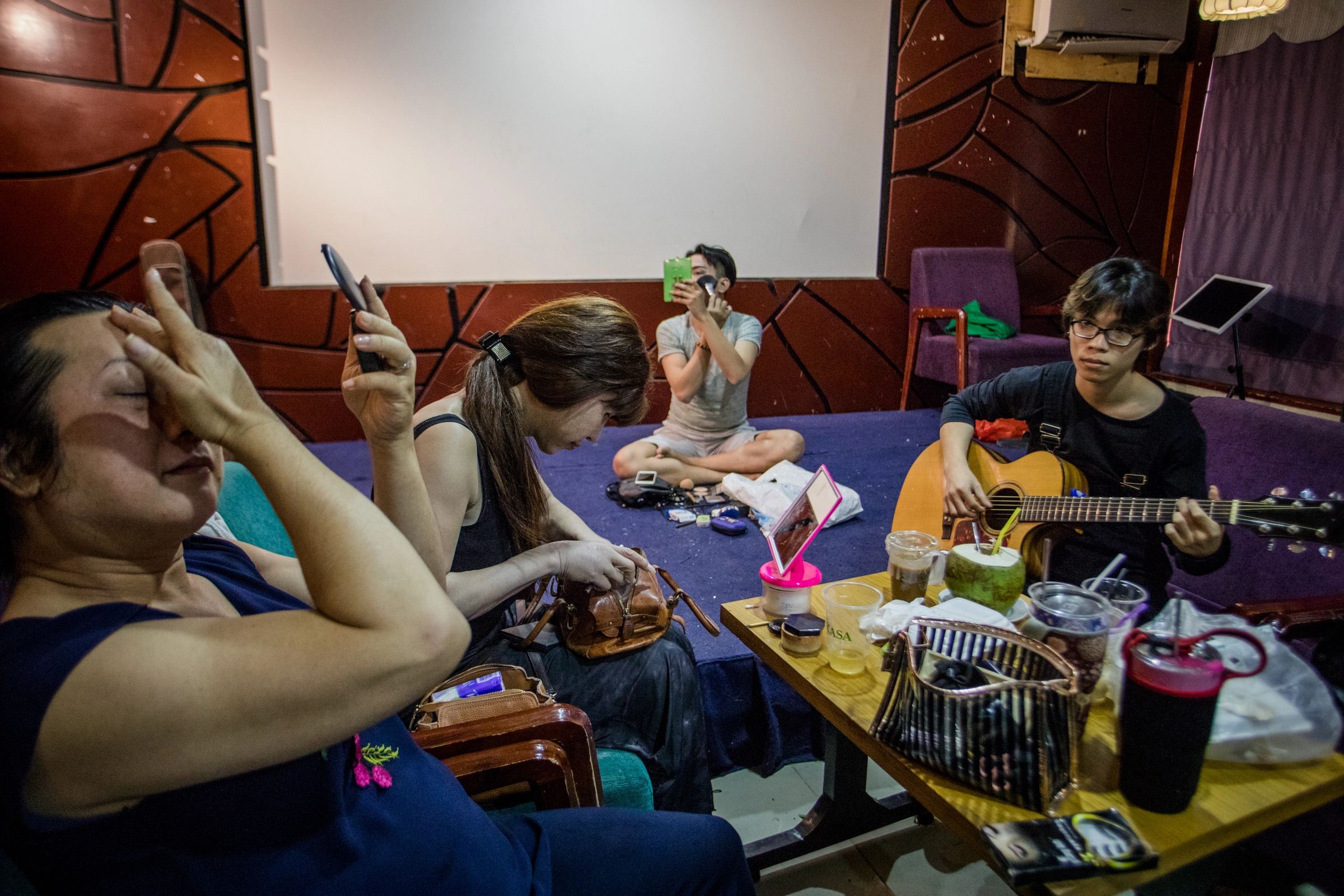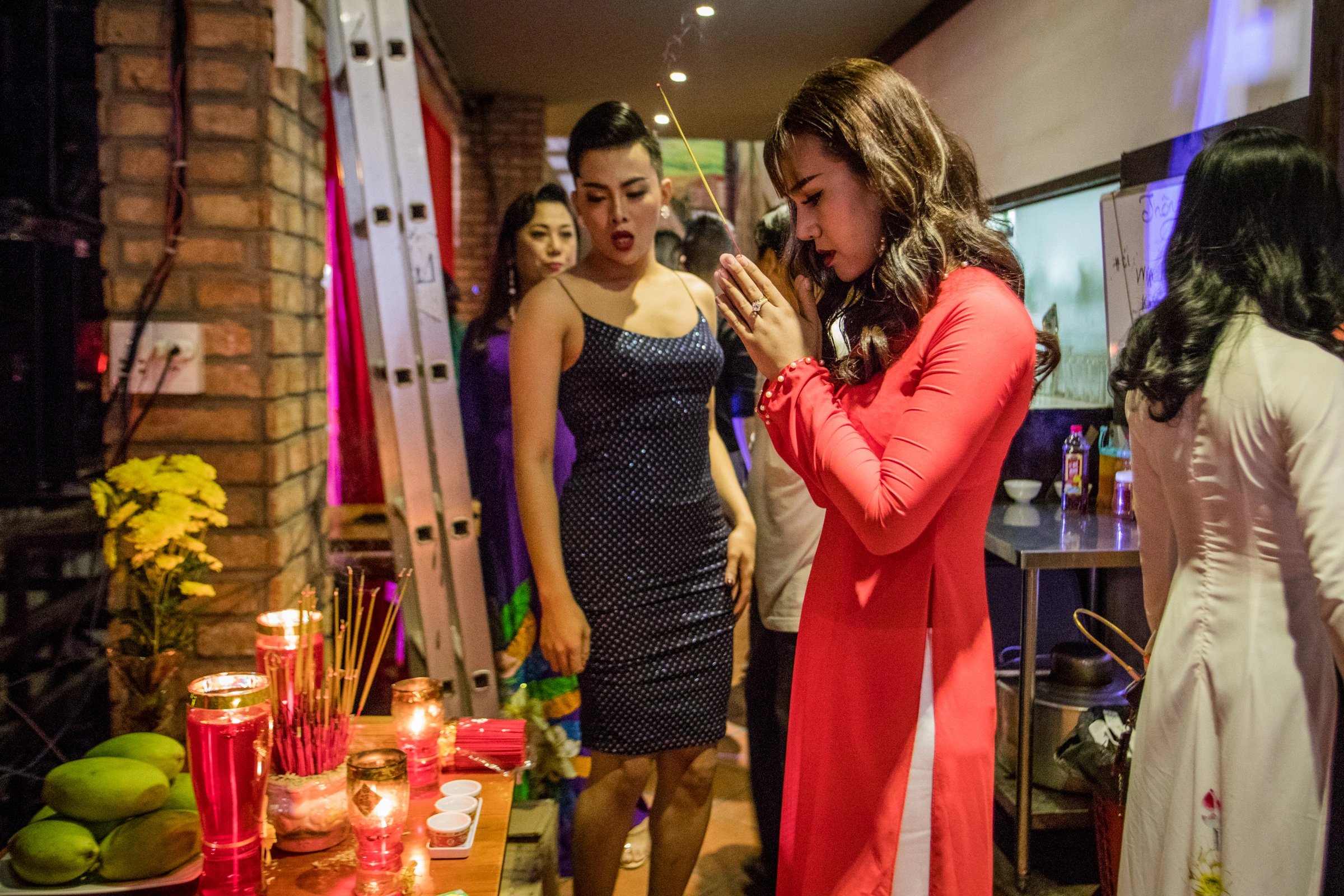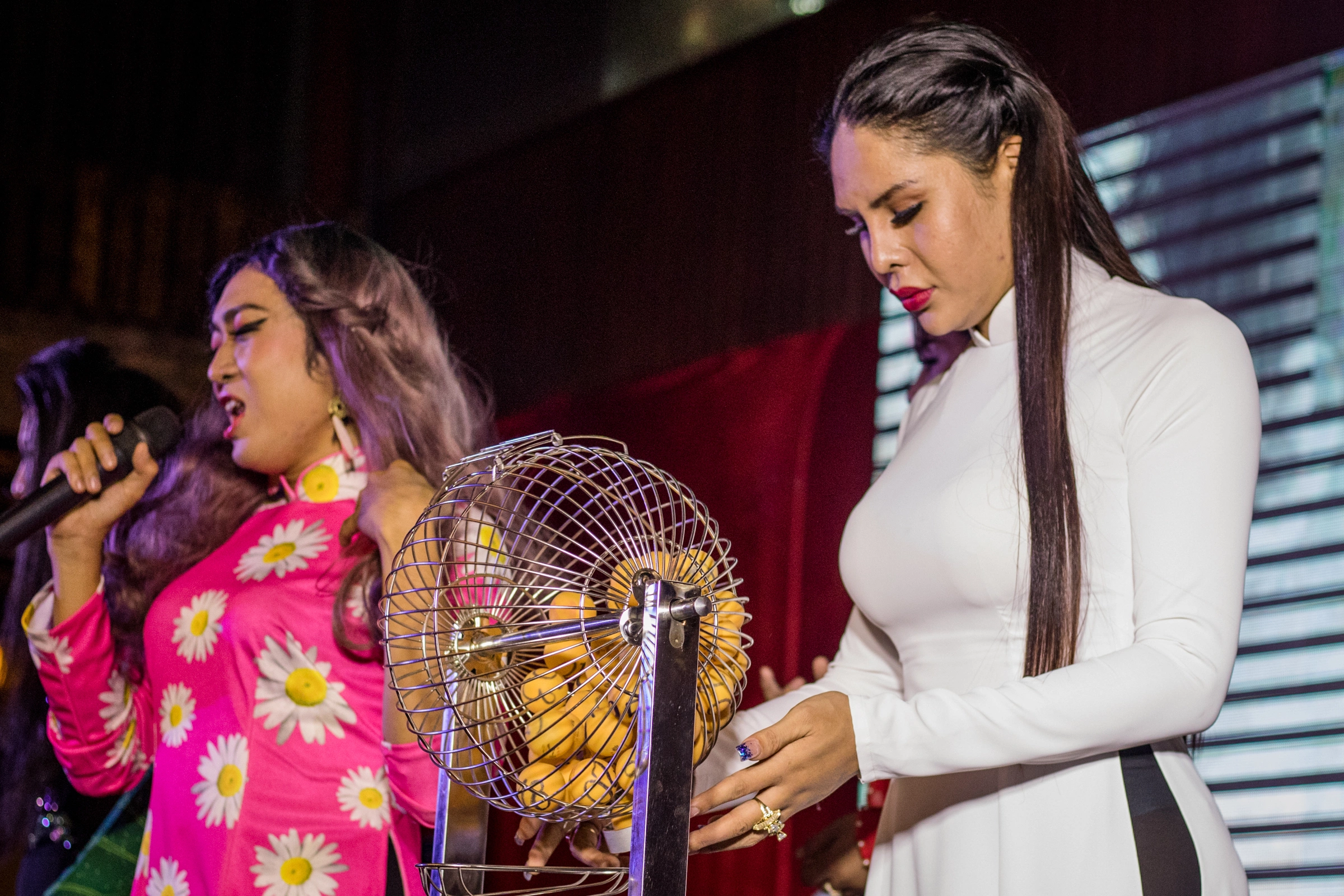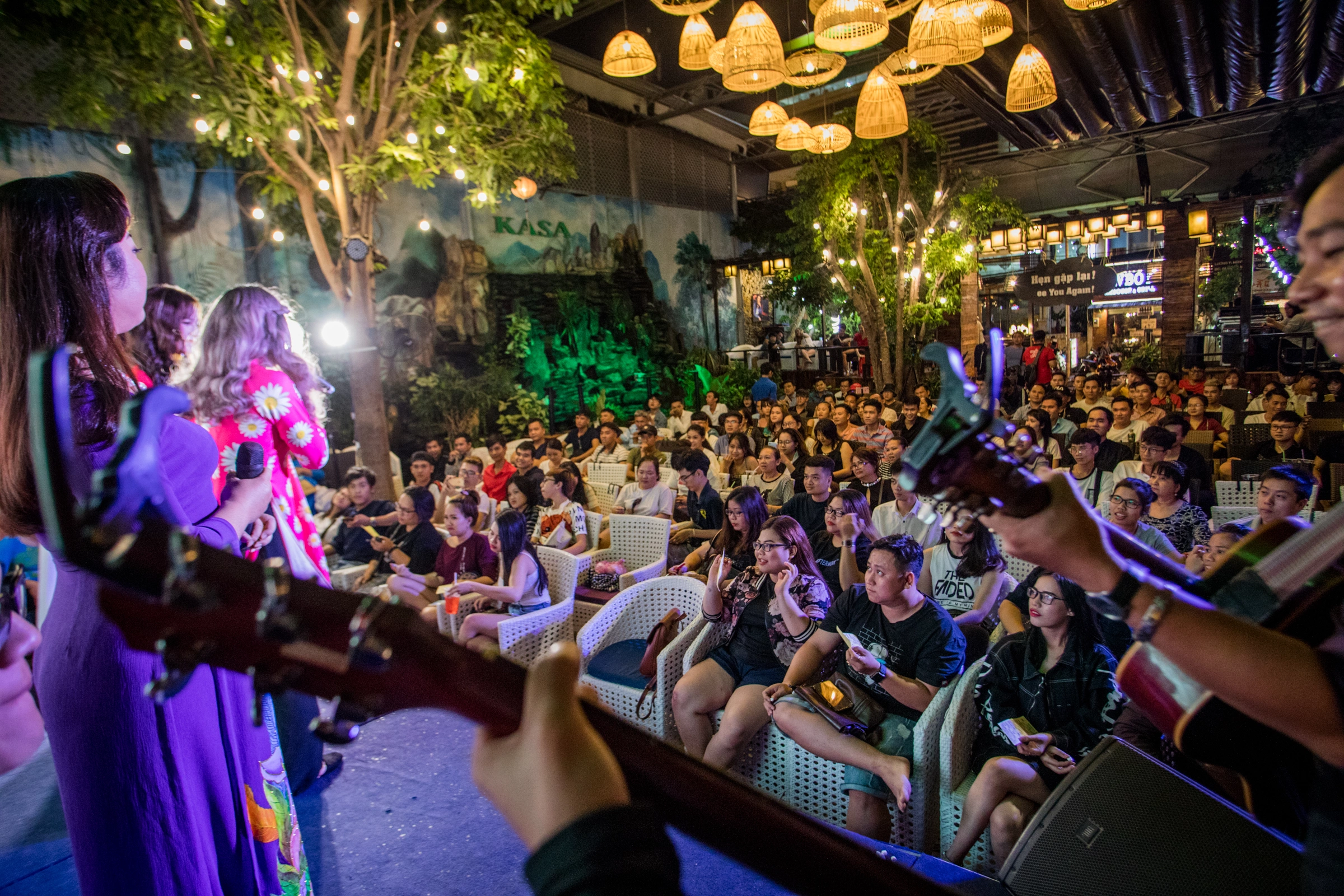A group of gay and transwomen are making up, but this is not your typical drag queen show. Their cabaret act incorporates a form of bingo, which is popular in this country.
The members of Huong Nam loto troupe are in a room on the second floor at Kasa Café, District 10, HCMC, immersed in their usual weekly pre-show routines.

Some focus on drawing precise brush lines on their cheeks, others rehearse while putting on foundation, and there is non-stop banter. They are all gay men or transwomen, and they pitch their deep voices higher and their body language is overtly feminine.
The two oldest performers, Nga (mirror in hand, left) and Phung (to her left) are getting dolled up for the show and so is a young performer sitting on stage. He will be the only one going up on stage with a pixie cut.
Bingo or loto, as it is called in Vietnam, is especially popular in the southern countryside.
The Huong Nam troupe chooses a different theme for every show. Before the performance, they sell to the audience a paper with a jumble of bingo numbers for VND10,000 or $0.43 each. The performers then sing songs based on the theme of that day’s show – acoustic or ballad night, for instance – interspersed with the bingo numbers.
The audience listens attentively to the lyrics and crosses out the numbers the performers call out. The person with the winning number is called to the stage and given a gift. The process is then repeated.
In France, the game is known as le lotto (or loto). In Germany, this game (called tombola) was used in the 19th century as an educational tool to teach children math, spelling and even history.

Loto originated in the 16th century as the Italian game of bingo, which then spread to England, France and other parts of Europe in the 18th century. It came to Vietnam with the French in the 19th century. Those were also its heydays, especially in the southwestern provinces, when everyone played it during the Lunar New Year festival.
SuSu, leader of the Huong Nam troupe, told VnExpress International: "Bingo or loto performances initially involved just traditional music. They would play traditional instruments like the drum and flute. Today, modern music has been added."
In southwestern rural areas, troupes would simply find a vacant spot and set up a loto stage and perform. City-based troupes like Huong Nam (meaning Scent of the South) mainly perform in cafés, public fairs or stadiums.
The amount of work and creativity that goes into each show is enormous since it is hard enough to engage the audience with just the performance. Putting random numbers into the music is much harder.
Back in the ‘green room,’ the artists make fun of each other’s attractive and not-so-attractive features, but also empower each other. The camaraderie and affection are palpable.
Rising millennial

"Slim" Little Tu, as everyone in the troupe endearingly calls the chubby 20-year-old, is the youngest performer in the group. Tu has been in loto for two years. But he already boasts an impressive CV: he played a supporting role in "TransViet Laugh", a stars-only version of Vinh Long Television's popular comedy reality show and has been on "Ganh Hat Ngan Hoa", Vietnam’s first ever TV loto show.
Describing himself as "peculiarly unattractive," Little Tu says other intriguing things too.
"My parents have come to see me perform a couple of times. My mom is very proud of me. One time she posted a picture of me dressed up as a woman on Facebook with the caption ‘My dear son’." He wondered with a giggle how people reacted to that post.
As he spoke, the banter continued.
"Do I look like a girl now?" he asked after the last brush of powder.
"You look like a girl even without makeup," the makeup artist responded.
When asked about his romantic interest, he said: "I go with my emotions. It doesn’t really matter if it’s a boy or girl."
Yumi, 27, has been a loto artist for seven years. She came to Saigon from An Giang Province in the Mekong Delta five months ago.
"I came across loto by chance; there was a loto group near my house," she said.
"I have artistic blood in me, so I accompanied the group. At first I was just a ticket seller, but one day they were short of performers and asked me to audition. My interest in loto began then."
She also sells stuff on social media for some extra income.
Like any struggling artist, she was unable to make ends meet at first. She used to get paid VND60,000 (less than $3) for a night’s performance. She makes VND500,000-600,000 ($21.40 - $25.70) now.
"When I was learning how to do this, I had to go to an Internet café and download music on my phone to learn the songs. I didn’t have easy access to the Internet."
Yumi’s parents were not happy with her decision at first. For a change in Vietnam, she is referring to her job rather than gender or sexual orientation: "My mother wanted me to have a steady job like teaching. But then once they saw I’m destined to be a loto performer, they approved and encouraged me."

Revered senior loto artists
While the youngest artist is relaxed about the show coming up, the two oldest performers are not. They are meticulously rehearsing their lines, improvising, accompanied by the guitarist. They debate when to hit a high note and when to stress the lyrics, and jot down the changes on crib sheets.
Nga is one of them.
With a background in reformed theater (cai luong), she has been a performing artist for 30 years, and doing loto for over 20. She was swept off her feet by a group of male loto artists playing the song lang, a percussion instrument used in traditional music.
That was the moment that marked her switch to loto from traditional folk music.
She says: "I first performed loto in Tay Ninh city [in the southwestern]. And then I went all the way to the north and back to perform.
"There was a hiatus after a while when loto performances with traditional music was not as popular and it fizzled out. Then troupes formed by young people brought life back to the loto scene and people started to be curious about it again. One of them is Huong Nam. They invited me to join, and here I am."
Nga and Phung, the other senior, were first invited to be guest performers, but they decided to stay after taking a great liking to the group members.
Nga continues: "I was planning to be a guest performer, but then I began to adore the Huong Nam loto artists and their stories and how they are dedicated to the craft and willing to listen and learn from their seniors."
Nga’s family – parents and other relatives - attends her shows when they can.
"Because I’m like this, I can’t have a family of my own," she says, gesturing at herself with her eyes. She identifies herself as a woman without revealing her sexual orientation.
In all her years in the business Nga has thought the biggest challenge as a loto artist is getting recognition and respect, especially from officials.
The art of loto is received positively by audiences and often employed as a tool to ridicule social evils. However, it has not been officially recognized for several reasons, including possibly its LGBT links.
The late Professor Tran Van Khe once said: "Loto is not purely entertainment but also meets the demand for cultural enjoyment of the Vietnamese, thereby contributing to transmitting and preserving proverbs, idioms, folk songs which are considered cultural heritages and preventing them from dying out."
Khe, a revered icon on the musical landscape, was a musicologist and an honorary member of UNESCO’s International Music Council.
Trans or not

Linh Anh (sitting, right) is fully supported by her partner.
"My family knew I was a girl. They encouraged me to be true to myself. When I was 18, my mom asked whether I wanted to get a wife.
It was clearly a rhetorical question because her mother already knew the answer. "I want to BE a wife, I told her."
When she is not singing Loto on stage, Linh Anh is a student at the HCMC Dance School majoring in choreography and gives dance lessons to kids in elementary and middle schools.
The 27-years-old hugely admires transpeople who have undergone surgery, some of whom are her fellow performers in Huong Nam.
Boi Nhi (sitting, left) is a favorite performer of Huong Nam troupe. When she is not busy with loto, Nhi also works as a freelance actress and health consultant at My Home Clinic, an LGBTQI-friendly clinic.
At an LGBT event hosted by the U.S. Consulate General in August, she said that hormones used by transgender individuals are not regulated in Vietnam. "Transgenders like me who use these hormones are not protected by law," Nhi said. Homosexuals who want to become transgenders often look up to those who have already had sex reassignment surgery and seek their advice on hormone use, the actress said.
"We have no idea what these pills contain. Because the Ministry of Health does not inspect and supervise these hormone pills, we as transgenders have to resort to advice from successfully transgendered people for medical advice and support so that we can eventually find ourselves just like they did," Nhi said.
"I seriously cannot go through what they went through. But I’m a woman anyway, so I don’t feel the need to have surgery. Besides, I like to transform myself and make others eager to see my transformation. If I have surgery, I won’t have that ability," Linh Anh added.
Unlike many other 20s-something artists, she cannot sing modern music. "I am trained in cai luong (reformed theater), so I try to do contemporary dance to cai luong music."
After everyone puts on their best dress and completes their rehearsal, they go backstage. Yumi prays to the tutelary gods of the arts before every show, a spiritual practice that is believed to sustain the artists during their performance.
Individual performers walk out to the stage and bow to and wave at the audience gracefully as the host introduces each of them as if it were a pageant. The audience greets them with raucous cheers.

Yumi and some of the others sell loto tickets to the audience, walking down the aisles between chairs, running into many obvious regulars.
About a decade ago loto tickets were only VND1,000-2,000 each. At Kasa café, a ticket is VND10,000 ($0.43) and there are people who buy many tickets.
The show begins.

In the art’s heydays, Loto artists performed around the clock across the country. They dived into the heat of melodies and chants to the cheers of the audience, mostly farmers and children.

In a modern show, the audience members are from all walks of life and of all age groups. Every five minutes or so there is resounding laughter as the artists make a joke amidst a song or stage a comedy skit.
A kid in the audience, eyes wide, asks loudly: "Why are those men wearing dresses? It’s so weird!"
His father admonishes him: "Don’t say that. They are women."
Story by Sen
Photos by Thanh Nguyen